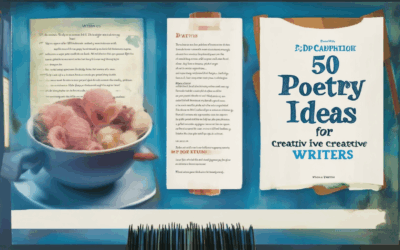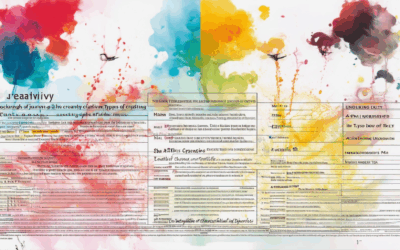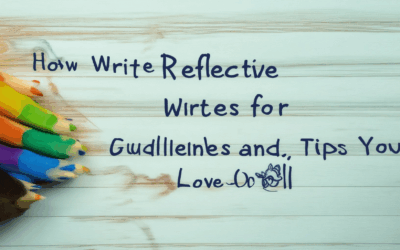Writing poetry can be a magical experience, but sometimes the blank page feels more like a barrier than a canvas. Whether you’re a seasoned poet or someone just dipping their toes into the world of verse, finding the right prompts to ignite your creativity can transform a daunting task into a delightful journey. From crafting heartfelt verses to exploring deep emotional themes, creative writing prompts for poets offer a wealth of possibilities to unlock your imagination and channel your unique voice. In this article, we’ll dive into the best poetry prompts designed to inspire, challenge, and guide you toward creating poetry that resonates deeply with both you and your readers.

Good Topics for Writing a Poem
Writing a poem can be a deeply personal and rewarding experience. Here are some thoughtfully curated topics to inspire your creativity:
- Personal Memories:** Reflect on a significant moment in your life, such as a memorable birthday, a childhood fear, or a cherished experience.
- Nature:** Capture the beauty of the world around you, whether it’s a serene sunset, a towering mountain, or the gentle rhythm of waves.
- Emotions:** Explore complex feelings like love, loss, joy, or heartbreak, and how they shape your perspective on life.
- Abstract Concepts:** Dive into abstract ideas such as time, existence, or the essence of humanity, allowing for rich metaphorical language.
- Seasonal Themes:** Write about the changing seasons, each offering unique emotions and imagery, from winter’s silence to spring’s rebirth.
- Unique Narratives:** Consider unconventional perspectives, such as a conversation with an inanimate object or a letter to a long-lost person.
These topics invite introspection and provide a foundation for crafting poems that resonate personally and universally. Whether you choose a personal anecdote or a broader theme, let your imagination guide you toward a meaningful and impactful creation.
How to Teach Poetry and Creative Writing
To effectively teach poetry and creative writing, consider implementing these organized strategies:
- Establish a Writing Routine : Encourage students to set aside dedicated time daily for poetry and creative writing. Suggest using tools like journals or digital platforms to track progress.
- Foster Creativity Through Exercises : Introduce creative writing exercises such as free writing or stream-of-consciousness techniques to help students overcome writer’s block and explore unique ideas.
- Analyze Masterpieces : Study famous poems and works to inspire students. Discuss structural elements like rhyme, rhythm, and imagery, then encourage them to apply these concepts in their own writing.
- Encourage Reading and Reflection : Assign readings from various poets and authors. Have students reflect on themes, metaphors, and stylistic choices, then relate these observations to their own work.
- Provide Constructive Feedback : Offer detailed feedback focusing on strengths and areas for growth. Use examples to illustrate positive aspects and suggest improvements.
- Integrate Technology : Utilize online platforms like Silken Drum to share student work, engage in peer reviews, and discover community support. Explore virtual workshops or collaborative projects to enhance learning experiences.
By combining these methods, educators can create a dynamic environment that nurtures creativity and builds strong writing skills in students.

What Are the Best Poetry Prompts to Spark Your Imagination?
Discover a world of poetic inspiration with these thought-provoking prompts designed to ignite your creativity:
- Write a poem about a moment you wish you could relive.
- Describe a scene from your favorite book in your own words.
- Poetify a conversation between two historical figures.
- Write a limerick about something funny that happened to you.
- Express your fear of failure in a free verse poem.
- Paint a picture with words of your ideal vacation spot.
- Write a haiku about the first thing you notice outside your window.
- Share your thoughts on the meaning of home.
- Create a poem about a problem you overcame.
- Imagine a dialogue between two elements of nature.
- Write a sonnet dedicated to someone who inspires you.
- Describe a magical object you’d love to possess.
- Reflect on the lessons you’ve learned from past mistakes.
- Write a poem about a hidden talent you haven’t revealed.
- Poetify your favorite childhood memory.
- Express your feelings about technology’s impact on life.
- Write a poem about a secret you’ve kept to yourself.
- Describe the perfect day in your ideal city.
- Share your perspective on the concept of infinity.
- Write a poem about a challenge you’re currently facing.
- Poetify the process of falling in love.
- Imagine a conversation between two animals.
- Write a poem about a historical event you’d change.
- Describe the essence of your favorite season.
- Reflect on the importance of curiosity in learning.
- Write a poem about a character from your imagination.
- Express your views on the role of art in society.
- Describe a scene from a futuristic city.
- Write a poem about a meaningful friendship.
- Poetify the process of discovering a new hobby.
- Imagine a dialogue between two famous inventors.
- Write a poem about a moment of pure joy.
- Reflect on the significance of a single flower.
- Describe the journey of a lost item finding its way home.
- Write a poem about the magic of a first kiss.
- Imagine a conversation between two celestial bodies.
- Reflect on the impact of a single act of kindness.
- Write a poem about the wonder of the ocean.
- Describe the experience of losing and finding oneself.
- Poetify the process of growing older.
- Imagine a dialogue between two mythological creatures.
- Write a poem about the beauty of a sunset.
- Reflect on the concept of true love.
- Describe the joy of discovering a hidden talent.
- Write a poem about the magic of a rainy day.
- Imagine a conversation between two trees.
- Reflect on the importance of perseverance.
- Write a poem about the wonder of space exploration.
- Describe the experience of meeting a stranger who becomes a friend.
- Poetify the process of learning a new language.
- Imagine a dialogue between two planets.
- Write a poem about the magic of music.
- Reflect on the concept of time travel.
- Describe the journey of a seed becoming a tree.
- Write a poem about the beauty of a starry night sky.
- Imagine a conversation between two animals.
- Reflect on the importance of environmental conservation.
- Write a poem about the magic of a snowflake.
- Describe the experience of discovering a hidden beach.
- Poetify the process of overcoming a fear.
- Imagine a dialogue between two ships on the open sea.
- Write a poem about the wonder of the human body.
- Reflect on the concept of the soul.
- Describe the journey of a river flowing to the sea.
- Write a poem about the magic of a rainbow.
- Imagine a conversation between two mountains.
- Reflect on the importance of storytelling.
- Write a poem about the beauty of a cherry blossom tree.
- Describe the experience of watching a sunrise over the horizon.
- Poetify the process of falling in love with a place.
- Imagine a dialogue between two birds.
- Write a poem about the magic of a thunderstorm.
- Reflect on the concept of the unknown.
- Describe the journey of a drop of water finding its way home.
- Write a poem about the wonder of the universe.
- Imagine a conversation between two galaxies.
- Reflect on the importance of curiosity in science.
- Write a poem about the magic of a full moon.
- Describe the experience of standing at the edge of the Grand Canyon.
- Poetify the process of discovering a new passion.
- Imagine a dialogue between two historical figures from different cultures.
- Write a poem about the beauty of a wildflower field.
- Reflect on the concept of the circle of life.
- Describe the journey of a child learning to ride a bicycle.
- Write a poem about the magic of a library.
- Imagine a conversation between two animals in the jungle.
- Reflect on the importance of education in personal growth.
- Write a poem about the wonder of the Northern Lights.
- Describe the experience of discovering a hidden cave.
- Poetify the process of learning to play an instrument.
- Imagine a dialogue between two ships during a stormy sea.
- Write a poem about the beauty of a desert oasis.
- Reflect on the concept of the passage of time.
- Describe the journey of a ship sailing through unknown waters.
- Write a poem about the magic of a newborn baby’s laughter.
- Imagine a conversation between two trees in a forest.
- Reflect on the importance of family traditions.
- Write a poem about the wonder of a mountain peak.
- Describe the experience of watching a bird migrate south for winter.
- Poetify the process of learning to cook a traditional dish.
- Imagine a dialogue between two animals preparing for hibernation.
- Reflect on the concept of the changing seasons.
- Write a poem about the magic of a campfire under the stars.
- Describe the journey of a fish swimming upstream against the current.
- Write a poem about the beauty of a rose blooming in winter.
- Reflect on the concept of the power of words.
- Describe the experience of standing atop a mountain after reaching the summit.
- Poetify the process of learning to paint like a master artist.
- Imagine a conversation between two explorers discovering a new land.
- Reflect on the importance of the written word in preserving history.
- Write a poem about the wonder of a labyrinthine garden.
- Describe the journey of a bee collecting pollen from a flower.
- Write a poem about the magic of a child’s imagination.
- Imagine a dialogue between two characters from a fairy tale.
- Reflect on the concept of the harmony of nature.
- Write a poem about the beauty of a snow-covered landscape.
- Describe the experience of watching a child learn to tie their shoes for the first time.
- Poetify the process of learning to play chess like a grandmaster.
- Imagine a conversation between two scientists discussing a new discovery.
- Reflect on the importance of the power of silence.
- Write a poem about the wonder of a comet streaking across the sky.
- Describe the journey of a ship navigating through an iceberg-filled sea.
- Write a poem about the magic of a dog’s loyalty and love.
- Imagine a dialogue between two characters from a classic novel.
- Reflect on the concept of the interconnectedness of all things.
- Write a poem about the beauty of a cherry tree in bloom.
- Describe the experience of watching a sunrise over the Pacific Ocean.
- Poetify the process of learning to surf like a pro surfer.
- Imagine a conversation between two astronauts on the International Space Station.
- Reflect on the importance of the concept of home.
- Write a poem about the wonder of a tiger in its natural habitat.
- Describe the journey of a elephant traveling across the African savannah.
- Write a poem about the magic of a child’s laughter echoing through a village.
- Imagine a dialogue between two characters from a Shakespearean play.
- Reflect on the concept of the power of a single gesture.
- Write a poem about the beauty of a garden filled with vibrant flowers.
- Describe the experience of standing on the edge of a cliff overlooking the ocean.
- Poetify the process of learning to play the piano like a concert pianist.
- Imagine a conversation between two characters from a sci-fi movie.
- Reflect on the importance of the concept of hope.
- Write a poem about the wonder of a starry night sky above a mountain peak.
- Describe the journey of a ship navigating through the Arctic icebergs.
- Write a poem about the magic of a child’s first day at school.
- Imagine a dialogue between two characters from a historical romance novel.
- Reflect on the concept of the power of a single word.
- Write a poem about the beauty of a lake reflecting the surrounding mountains.
- Describe the experience of watching a child learn to ride a bike for the first time.
- Poetify the process of learning to bake the perfect chocolate chip cookie.
- Imagine a conversation between two characters from a mystery novel.
- Reflect on the importance of the concept of redemption.
- Write a poem about the wonder of a firefly lightening up the night sky.
- Describe the journey of a moth flying toward a flame it cannot resist.
- Write a poem about the magic of a child’s first day at a new school.
- Imagine a dialogue between two characters from a fantasy epic.
- Reflect on the concept of the power of a single memory.
- Write a poem about the beauty of a garden filled with vibrant colors and scents.
- Describe the experience of standing on the threshold of a new chapter in life.
- Poetify the process of learning to play the guitar like a rockstar.
- Imagine a conversation between two characters from a horror movie.
- Reflect on the importance of the concept of courage.
- Write a poem about the wonder of a rainbow appearing after a heavy rainstorm.
- Describe the journey of a bird migrating across the Atlantic Ocean.
- Write a poem about the magic of a child’s first day at a new home.
- Imagine a dialogue between two characters from a comedy film.
- Reflect on the concept of the power of a single smile.
- Write a poem about the beauty of a valley surrounded by towering peaks.
- Describe the experience of watching a child learn to swim for the first time.
- Poetify the process of learning to draw like a professional artist.
- Imagine a conversation between two characters from a crime thriller novel.
- Reflect on the importance of the concept of justice.
- Write a poem about the wonder of a comet impacting the Earth.
- Describe the journey of a ship navigating through a storm in the middle of the ocean.
- Write a poem about the magic of a child’s first day at a new school.
- Imagine a dialogue between two characters from a classic Western film.
- Reflect on the concept of the power of a single handshake.
- Write a poem about the beauty of a cherry tree in full bloom.
- Describe the experience of standing on the edge of a mountain cliff overlooking the clouds.
- Poetify the process of learning to play the violin like a classical musician.
- Imagine a conversation between two characters from a dystopian future.
- Reflect on the importance of the concept of love and loss.
- Write a poem about the wonder of a star exploding in the night sky.
- Describe the journey of a ship sailing through the Bermuda Triangle.
- Write a poem about the magic of a child’s laughter echoing through a quiet neighborhood.
- Imagine a dialogue between two characters from a historical drama set in ancient Rome.
- Reflect on the concept of the power of a single tear.
- Write a poem about the beauty of a garden filled with aromatic herbs and flowers.
- Describe the experience of standing on the shore of a serene lake at dawn.
- Poetify the process of learning to fly like a bird in the sky.
- Imagine a conversation between two characters

Writing Poetry: A Step-by-Step Guide
To begin writing poetry, start by selecting a subject or theme that resonates with you personally. Whether it’s a cherished memory, a vivid emotion, or a daily routine, allow your unique perspective to guide your words.
1. Choose Your Medium
Poetry can be written in various forms, such as sonnets, haiku, free verse, or prose poetry. Experiment with different structures to find what suits your style best.
2. Capture Sensory Details
Engage your senses by describing what you see, hear, smell, taste, and touch. Use vivid imagery to paint a picture in the reader’s mind. For example:
- Sound: “The gentle creak of the swing” or “The distant hum of the town”
- Sight: “The colors of the sunset” or “The hues of gold and red”
- Touch: “The cool breeze against my skin”
- Smell: “The scent of freshly cut grass”
3. Show, Don’t Tell
Express emotions and thoughts through actions and descriptions rather than directly stating them. For instance:
- “Her eyes sparkled, laughter filled the room” instead of “She loved him.”
4. Use Similes and Metaphors
Compare unfamiliar concepts to something familiar. This enhances understanding and adds depth to your poetry:
- “The sound of his laughter was like a symphony in the park.”
5. Consider Structure and Rhythm
While free verse is flexible, many poets find rhythm and structure helpful. Try using a simple rhyme scheme like AABB or ABAB to give your poem a flowing feel:
- Example: “Sun sets low, / Breeze whispers through, / Swing creaks soft, / Memory grows.”
6. Edit and Refine
Review your poem to remove unnecessary words and enhance clarity. Read it aloud to ensure it flows smoothly and conveys the intended emotion.
7. Conclude Thoughtfully
End your poem with a reflection or a lingering image that invites the reader to ponder or relate to your experience:
- “The swing rocked gently, carrying me away, to a place where time stood still, and memories took hold.”
By following these steps, you can craft a poem that captures the essence of your experience and resonates with others. Happy writing!
What Not to Do When Writing Poetry
Writing poetry is a unique art form that requires creativity, emotion, and craftsmanship. While there are no strict rules, certain habits and mistakes can hinder your progress as a poet. Here are some common pitfalls to avoid:
- 1. Relying Too Heavily on Clichés Cliches are overused phrases that lose their impact when reused. Avoid relying on them to convey your emotions or ideas. Instead, seek fresh metaphors and imagery that truly reflect your perspective.
- 2. Neglecting Editing Many poets rush through their drafts without revising. Take the time to edit your work, removing unnecessary words, tightening sentences, and ensuring your poem flows smoothly. A polished piece reads more professional and impactful.
- 3. Being Overly Literal Great poetry often transcends literal meanings. Allow your imagination to wander and explore deeper themes and symbols. Avoid being too tied to the surface meaning of your words.
- 4. Ignoring Sentence Variety Vary your sentence structure to keep your poetry engaging. Mix short and long lines, and avoid repetitive patterns. This adds rhythm and texture to your work.
- 5. Skipping Rhyme Schemes While free verse is a popular choice, many poems benefit from a structured rhyme scheme. Experiment with different schemes to see which best fits your vision for the poem.
- 6. Failing to Show, Not Just Tell Use descriptive language to paint vivid pictures rather than simply stating ideas. Show your emotions and thoughts through imagery and metaphor.
- 7. Overusing Abstract Concepts While abstract concepts like love or time can be powerful, overuse them without concrete imagery can leave your poem feeling vague. Ground your ideas in relatable experiences or sensory details.
- 8. Neglecting Word Choice Choose words carefully to convey precise emotions and imagery. Avoid words that are too generic or lack punch. Strive for words that resonate deeply with your audience.
- 9. Not Reading Other Poets Study the works of established poets to learn from their techniques and styles. Reading widely helps you develop your own unique voice while avoiding common mistakes.
- 10. Focusing Only on Form Don’t let the structure of the poem overshadow its content. Balance form and content to create pieces that are both technically sound and emotionally resonant.
By avoiding these common pitfalls, you can create poetry that is meaningful, engaging, and uniquely yours. Remember, the goal is to express something profound through the beauty and simplicity of language.

How Poets Get Ideas to Write Poems
Poets often draw inspiration from various sources to spark creativity and craft meaningful verses. Here are some common methods they employ:
- Daily Life and Observations: Many poets find inspiration in ordinary moments. Paying attention to small details, like the way light changes on a windowsill or the sound of a neighbor’s laughter, can ignite a poem.
- Reading Great Poetry: Exploring works by established poets can open up new perspectives. Immerse yourself in different styles and themes to discover what resonates with you personally.
- Personal Experiences and Emotions: Reflect on your own feelings and memories. Journaling or meditating on these can help you articulate complex emotions in a poetic form.
- Nature and the Environment: Nature often serves as a rich source of imagery and metaphor. Walk in the park, observe the seasons, or study the stars to find natural motifs.
- Music and Art: Listening to music or viewing art can inspire poetic expressions. The rhythm of a song or the colors in a painting might guide your words.
- Imagination and Fantasy: Poets frequently use their imagination to create fantastical worlds. Allow your mind to wander into uncharted territories to uncover unique ideas.
To further your poetic journey, consider exploring:
- Libraries and Bookstores: Discover diverse literature and be inspired by different cultures and perspectives.
- Art Museums: Gain visual inspiration that can translate into poetic imagery.
- Workshops and Classes: Join poetry groups or take classes to learn techniques and meet fellow poets.
- Online Communities: Engage with platforms like Silken Drum to connect with like-minded creatives and share your work.
Remember, poetry is a deeply personal craft. Trust your instincts and let your unique perspective shine through your words.




0 Comments